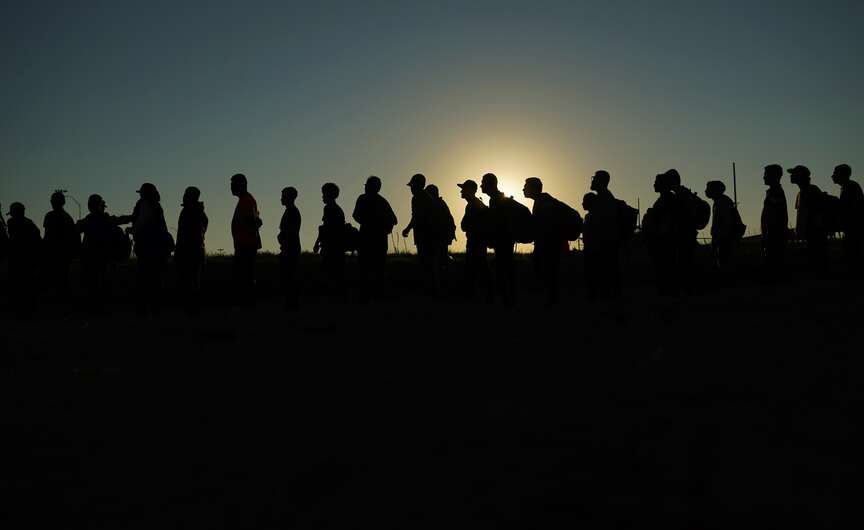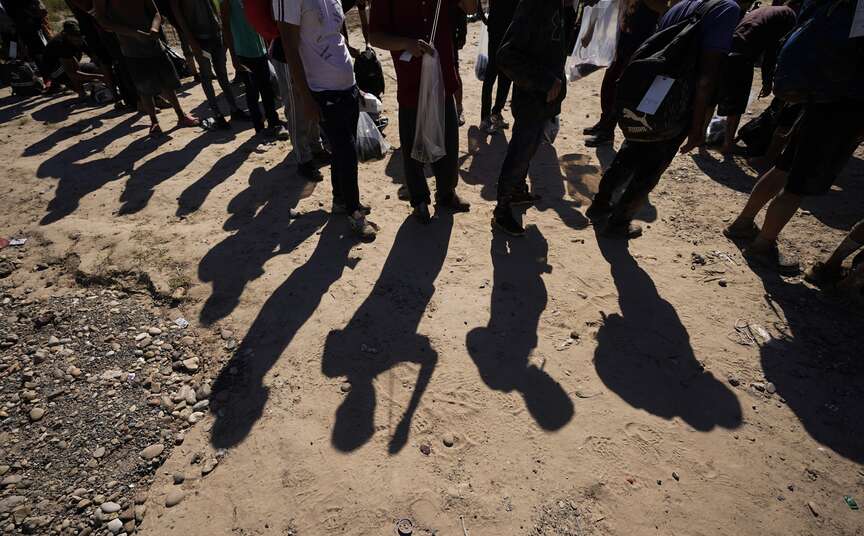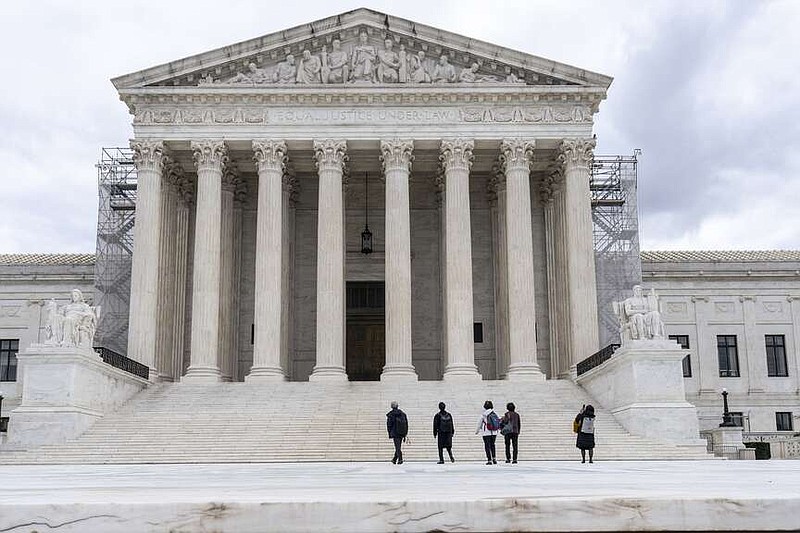A federal appeals court late Tuesday issued an order that again prevents Texas from arresting migrants suspected of entering the U.S. illegally, hours after the Supreme Court allowed the strict new immigration law to take effect.
The decision by the 5th U.S. Circuit Court of Appeals comes weeks after a panel on the same court cleared the way for Texas to enforce the law by putting a pause on a lower judge's injunction.
But by a 2-1 order, a panel of the appeals court lifted that pause ahead of arguments before the court on Wednesday.
Texas authorities had not announced any arrests made under the law.
Earlier, a divided Supreme Court allowed Texas to begin enforcing a law that gives police broad powers to arrest migrants suspected of crossing the border illegally while a legal battle over the measure plays out.
The conservative majority's order rejects an emergency application from the Biden administration, which says the law is a clear violation of federal authority that would cause chaos in immigration law.
Texas Gov. Greg Abbott praised the order, and the law, which allows police in Texas to arrest migrants for illegal entry and authorizes judges to order them to leave the United States.
Texas Attorney General Ken Paxton called the high court's order Tuesday a "huge win" and a defeat for the Biden administration and said the state law is "now in effect."
The measure imposes state criminal penalties of up to six months in jail on noncitizens who illegally enter Texas from Mexico. Anyone accused of reentering the country illegally could face felony charges. Lawmakers also empowered state judges to order deportations to Mexico -- without Mexico's consent -- and allowed local law enforcement personnel to carry out those orders. Judges may also drop state charges if a migrant agrees to return to Mexico voluntarily.
The high court didn't address whether the law is constitutional, but it could eventually review the law after the measure is heard before the appellate court.
If the law had remained in effect long enough after reinstatement for Texas to being arresting migrants, it was unclear where any ordered to leave might go. The law calls for them to be sent to ports of entry along the U.S.-Mexico border, even if they are not Mexican citizens.
But Mexico's government said Tuesday that it would not "under any circumstances" accept the return of any migrants to its territory from the state of Texas. Mexico is not required to accept deportations of anyone except Mexican citizens.
It had condemned the Texas law being allowed to take effect, saying it would criminalize migrants and lead to the separation of families, discrimination and racial profiling. The government said it would put its position before the appeals court considering the law.
"Mexico rejects any measure that allows state or local authorities to handle immigration control, detain or return nationals or foreigners to Mexican territory," the Foreign Affairs ministry said in a statement.
The Supreme Court's majority did not write a detailed opinion in the case, as is typical in emergency appeals, but the decision to let the law go into effect drew dissents from liberal justices Ketanji Brown Jackson, Elena Kagan and Sonia Sotomayor.
"The court gives a green light to a law that will upend the longstanding federal-state balance of power and sow chaos," Sotomayor wrote in a blistering dissent joined by Jackson.
The law, known as Senate Bill 4, is considered by opponents to be the most dramatic attempt by a state to police immigration since an Arizona law more than a decade ago, portions of which were struck down by the Supreme Court. Critics have also said the Texas law could lead to civil rights violations and racial profiling.
White House press secretary Karine Jean-Pierre called the law "harmful and unconstitutional" and said it would burden law enforcement while creating confusion. She called on congressional Republicans to settle the issue with a federal border security bill.
The advocacy group FWD.us said the Supreme Court's decision could encourage other states to pass laws encroaching on federal authority. Andrea Flores, the organization's vice president for Immigration Policy and Campaigns, said the law will "unjustly target Texas families, including American citizens, longtime undocumented residents awaiting federal relief and recent migrants seeking legal protections."
TEXAS' DEFENSE
Texas, for its part, has argued that it has a right to take action over what authorities have called an ongoing crisis at the southern border. The Texas Department of Criminal Justice said in a statement that it is "prepared to handle any influx in population" associated with the state law.
Texas sheriffs' offices have been preparing for the implementation of Senate Bill 4 since the state's legislative session last year, said Skylor Hearn, executive director of the Sheriffs' Association of Texas.
The law allows police in counties bordering Mexico to make arrests if they see someone crossing the border illegally, he said. It could also be enforced elsewhere in Texas if someone is arrested on suspicion of another violation and a fingerprint taken during jail booking links them to a suspected re-entry violation. It likely would not come into play during a routine traffic stop, he said.
Arrests for illegal crossings along the southern border hit record highs in December but fell by half in January, a shift attributed to seasonal declines and heightened enforcement. The federal government has not yet released numbers for February.
Some Texas officials sounded a cautious note.
"A lot of the local police chiefs here, we don't believe it will survive a constitutional challenge. It doesn't look like it's going to, because a Texas peace officer is not trained. We have no training whatsoever to determine whether an individual is here in this country legally," Hidalgo County Sheriff Eddie Guerra said.
He serves as president of the Southwestern Border Sheriffs' Coalition representing 31 border counties from Texas to California.
Jorge Dominguez, a staff attorney for El Paso-based Las Americas Immigrant Advocacy Center -- one of the groups challenging the law -- said the Supreme Court's order is a gut punch that will impact not only immigrants in Texas but also any state resident of color. Dominguez said his center's clients, most of whom are immigrants in various types of legal proceedings, have signaled that they will go into hiding and limit their presence in the community if the law takes effect.
"Could I be detained because I'm brown, speak Spanish fluently and look like someone who crossed into Texas illegally?" Dominguez, who is a U.S. citizen, mused. "This law essentially makes anyone like me vulnerable to any law enforcement officer in the state who wants to play the game 'Guess the immigrant.'"
Law enforcement agencies across the state, including Houston police, have said the law threatens their relationship with immigrant communities and may prevent people from calling 911 during emergencies out of fear they could face arrest because of their immigration status. Community organizations have been preparing residents for months with workshops about their constitutional rights to remain silent and the prohibition against unreasonable search and seizure and what to do if they are arrested.
Conservative Justice Amy Coney Barrett suggested that her vote in favor of Texas stemmed from the technicalities of the appeals process rather than agreement with the state on the substance of the law.
"So far as I know, this court has never reviewed the decision of a court of appeals to enter -- or not enter -- an administrative stay. I would not get into the business. When entered, an administrative stay is supposed to be a short-lived prelude to the main event: a ruling on the motion for a stay pending appeal," she wrote in a concurring opinion joined by fellow conservative Justice Brett Kavanaugh.
They urged the 5th Circuit to act quickly and suggested that the dispute could soon be back before the justices.
The liberal justices pushed back, saying the 5th Circuit had already indefinitely upended the status quo by halting the lower court's injunction with a procedural one-line order that Sotomayor and Jackson characterized as "an abuse of discretion."
"This court makes the same mistake," Sotomayor wrote, "by permitting a temporary administrative stay to alter the status quo that has existed for over a century."
Kagan wrote separately to say that she, too, would have prevented the Texas law from taking effect, noting that immigration and the entry and removal of noncitizens "are matters long thought the special province of the federal government."
The battle over the Texas immigration law is one of multiple legal disputes between Texas officials and the Biden administration over how far the state can go to patrol the Texas-Mexico border and prevent illegal border crossings.
Several Republican governors have backed Abbott's efforts, saying the federal government is not doing enough to enforce existing immigration laws.
In 2012, the Supreme Court struck down key parts of an Arizona law that would have allowed police to arrest people in federal immigration violations, often referred to by opponents as the "show me your papers" bill. The divided high court found then that the impasse in Washington over immigration reform did not justify state intrusion.
Information for this article was contributed by Lindsay Whitehurst, Mark Sherman, Rebecca Santana, Valerie Gonzalez, Acacia Coronado and Chris Sherman of The Associated Press and by Ann E. Marimow, Arelis R. Hernández, Nick Miroff and Maria Sacchetti of The Washington Post.
 FILE - Migrants wait to climb over concertina wire after they crossed the Rio Grande and entered the U.S. from Mexico, Sept. 23, 2023, in Eagle Pass, Texas. A divided Supreme Court on Tuesday, March 19, 2024, lifted a stay on a Texas law that gives police broad powers to arrest migrants suspected of crossing the border illegally, while a legal battle over immigration authority plays out. (AP Photo/Eric Gay, File)
FILE - Migrants wait to climb over concertina wire after they crossed the Rio Grande and entered the U.S. from Mexico, Sept. 23, 2023, in Eagle Pass, Texas. A divided Supreme Court on Tuesday, March 19, 2024, lifted a stay on a Texas law that gives police broad powers to arrest migrants suspected of crossing the border illegally, while a legal battle over immigration authority plays out. (AP Photo/Eric Gay, File) FILE - Migrants who crossed the Rio Grande and entered the U.S. from Mexico are lined up for processing by U.S. Customs and Border Protection, Sept. 23, 2023, in Eagle Pass, Texas. A divided Supreme Court on Tuesday, March 19, 2024, lifted a stay on a Texas law that gives police broad powers to arrest migrants suspected of crossing the border illegally, while a legal battle over immigration authority plays out. (AP Photo/Eric Gay, File)
FILE - Migrants who crossed the Rio Grande and entered the U.S. from Mexico are lined up for processing by U.S. Customs and Border Protection, Sept. 23, 2023, in Eagle Pass, Texas. A divided Supreme Court on Tuesday, March 19, 2024, lifted a stay on a Texas law that gives police broad powers to arrest migrants suspected of crossing the border illegally, while a legal battle over immigration authority plays out. (AP Photo/Eric Gay, File) FILE - Migrants wait to be processed by the U.S. Customs and Border Patrol after they crossed the Rio Grande and entered the U.S. from Mexico, Oct. 19, 2023, in Eagle Pass, Texas. A divided Supreme Court on Tuesday, March 19, 2024, lifted a stay on a Texas law that gives police broad powers to arrest migrants suspected of crossing the border illegally, while a legal battle over immigration authority plays out. (AP Photo/Eric Gay, File)
FILE - Migrants wait to be processed by the U.S. Customs and Border Patrol after they crossed the Rio Grande and entered the U.S. from Mexico, Oct. 19, 2023, in Eagle Pass, Texas. A divided Supreme Court on Tuesday, March 19, 2024, lifted a stay on a Texas law that gives police broad powers to arrest migrants suspected of crossing the border illegally, while a legal battle over immigration authority plays out. (AP Photo/Eric Gay, File)